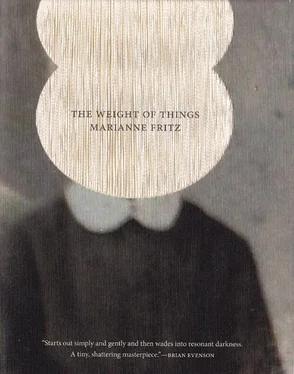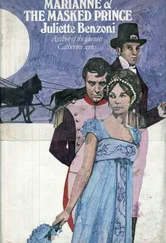“Wilhelmine. We have to go.”
Berta looked up, her eyes met Wilhelm’s, and in that moment he longed for the floor to open up and swallow him and Wilhelmine whole.
“So. So,” Berta said, and turned toward Wilhelmine: “He’s a good chauffeur. Does he take good care of you?”
Wilhelmine tried to look solemn, but was incapable of hiding the triumphant gleam in her eyes. Berta had understood!
“Yes. What can I say. There’s the occasional ‘if’ and ‘but,’ the occasional ‘on-the-one-hand’ and ‘on-the-other.’ But I don’t suppose he’s a bad man. He’s managed to make a little something of himself. No, he’s not bad. If you keep your ears open, if you look around the neighborhood, you can see he’s better than most.” Wilhelmine sighed. “If only I could break this habit of his, this doubting and brooding. That would be progress. But he just can’t seem to give it up.”
“Well then,” Berta said and twiddled her thumbs busily.
Wilhelmine felt the clock ticking and reached for Berta’s treasure one more time. “Believe me, my dear, believe me — life on the outside is no cakewalk. I would be happy to change places with you. You have everything here, there’s nothing for you to worry about, you’re always taken care of. No noise from the city, no bills, no rushing here and there. Just quiet, blessed quiet. No one curses at you, no one tells you off, no one makes you toe the line. You always were a bit of a disaster, weren’t you? Even as a child, no? But now all that’s finally over. You deserve a rest. You shouldn’t feel the least pang of conscience. I understand you, you know. Once someone’s been through what you have, they deserve a bit of peace and quiet. If they hadn’t sent you here, you’d be made out to be a black widow, a vulture, killing her children out of pure selfishness, to satisfy her own wanton urges, who knows, to have more time for her lover. Oh! People! Sometimes they’re so horrible, and from pure ignorance, too! People! I … I have to tell you that! But that’s no reproach, my little catastrophe. How could I reproach you? It was your disease that dragged you into this story, wasn’t it? Isn’t that the case?”
Berta giggled while Wilhelmine pawed her hand: “It’s true, it’s true. That damned illness. And anyhow, things are better for your children now, up there with the Lord God. They really were such miserable things, such sad little waifs. Most likely they’d never have come to any good. You shouldn’t reproach yourself. Everything does turn out for the best. And I mean everything. The Lord God makes sure of that. He knows there was nothing you could do about it. He knows what he’s doing. You poor, poor little thing, poor Berta. How can one person be so unlucky!”
And Wilhelmine pulled Berta’s head into her bosom, and as she looked down, pity and sympathy filled her shifty eyes; it was a commendable display of fellow feeling for the fate of Berta Schrei. The mercy she bestowed on this poor disaster made her eyes grow damp, and tears rolled down her fat cheeks as she turned Berta’s face to hers and gazed deep into her eyes. Moved by Wilhelmine’s compassion and understanding, Berta felt for the necklace with the Madonna trinket.
Placid and comprehending, Wilhelmine smiled, caressed Berta once more on the cheek, and said, “We’re the closest of friends, isn’t that so? We women understand one another. If only I could show you, in spite of everything, just how close I feel to you. But there’s nothing so dear to me that it would make a fitting gift for you. Really, I have nothing!” And Wilhelmine was aggrieved.
BERTA HANDS WILHELMINE THE CHAIN WITH THE MADONNA TRINKET
A few tears rolled down Berta’s cheek, a tremor rose up inside her and tugged at the corners of her mouth. Berta fidgeted with the clasp of the necklace for what seemed to Wilhelmine an eternity before she finally figured out how to open it. She cupped her left hand, laid the necklace inside it with her right, and stared at it, contemplative, almost brooding.
Wilhelmine was worried Berta might have second thoughts. Wilhelm held his breath. Just then he swore to himself that if Wilhelmine tried to snatch it, he would disregard her virtues and end their marriage right then and forever.
But she didn’t try to snatch it. Berta raised her cupped hand to Wilhelmine and said, “I have this,” looking at her as if she wished to say, “This is everything.”
Wilhelmine gave an extravagant sob, then moaned, “Berta! My poor dear! You can’t give that away! Berta! I simply can’t accept it! You have no idea what you’re doing!” She turned away, indignant.
Wilhelm sighed with relief. His fears had been needlessly bleak.
Berta came down from her bed, stood like a sparrow before Wilhelmine the dove, got up on her tiptoes, teetered, then, clumsily, but with unswerving resoluteness, placed the necklace with the Madonna trinket around Wilhelmine’s neck. When she saw what she’d done, she sat back on the bed, said, “So. So,” and began twiddling her thumbs frantically.
“Wilhelmine!” Wilhelm shouted. He had forgotten he was in a public place. “Wilhelmine!”
Wilhelmine looked over at him, helpless and contrite: “What should I do then, Wilhelm? What should I do? Wilhelm? You give it back to her. I can’t bring myself to spoil her happiness. You do it,” she whispered to him, and shrugged feebly.
Wilhelm knelt down in front of Berta, gathered up the fallen roses, and laid them back on her lap. “You have given Wilhelmine great joy. That was very generous of you,” he said, and cursed himself ten, twenty, a hundred times for every word he spoke.
Berta looked down at the roses’ slightly blemished buds, plucked off the petals and the leaves, giggled, and fell silent.
The inwardness she had struggled for, tirelessly and to no purpose, now suffused her face, and it would never leave her thereafter.
The Wise Little Mother saw this, and was pleased.
WILHELM CRIED AND LEFT
And Wilhelm cried.
The last time Wilhelm cried, he had been crawling after Rudolf’s head. Finally he grabbed hold of a shock of hair and pulled up on that trunkless head, thinking to seal away in his memory the features of his only friend, until he realized the thing he held was no longer Rudolf at all, it was little more than a scalp, that there was nothing left of Rudolf to hold onto; so he gave up and kissed what remained of Rudolf’s head, blown off by the machinery of war; he kissed the eyes, nose, mouth, cheeks, and forehead over and over, he daubed himself with Rudolf’s blood, longing to reattach the severed head to its torso, to breathe life back into his friend amid the torrent of bullets and grenades. His comrades in the trenches looked on with disgust as this bizarre spectacle unfolded, and went on dealing death from their various emplacements.
This time, Wilhelm didn’t wail or bellow as he had then, and his features weren’t quite so contorted. Instead, his sobs were soft, silent in fact; he cried without making a sound.
Berta’s hands edged warily toward his face, and she wiped away his tears, helpless and a little awkward. She looked past him as she did so. There was nothing left to say.
Wilhelm stood, turned around, and walked out. Wilhelmine watched him, perplexed, lingered a while longer in Ward 66, and finally said, “Well, Berta, until next time! Of course we’ll come visit you again!” Berta got up and pressed the roses into Wilhelmine’s hands, so forcefully that to refuse her would be uncalled-for. Berta turned, looked over at the Wise Little Mother, said, “So. So,” shrugged, and giggled.
Wilhelmine left.
WAS THE LONGING STILL THERE, AND THE BURNING SILENCE?
Having turned all the “on-the-one-hands” and “on-the-others,” all the “ifs” and “buts” over and over in her mind without arriving at any conclusion, the a-man-a-word-and-then-you’re-lost Berta turned to the Wise Little Mother for advice. “My Berta was looking inward, and so was my Rudolf. They really were, weren’t they? So why is it, Wise Little Mother, if I may ask you a question, why is it my Berta looked so little like the Madonna from the painting, and my Rudolf so little like the Christ Child?”
Читать дальше











